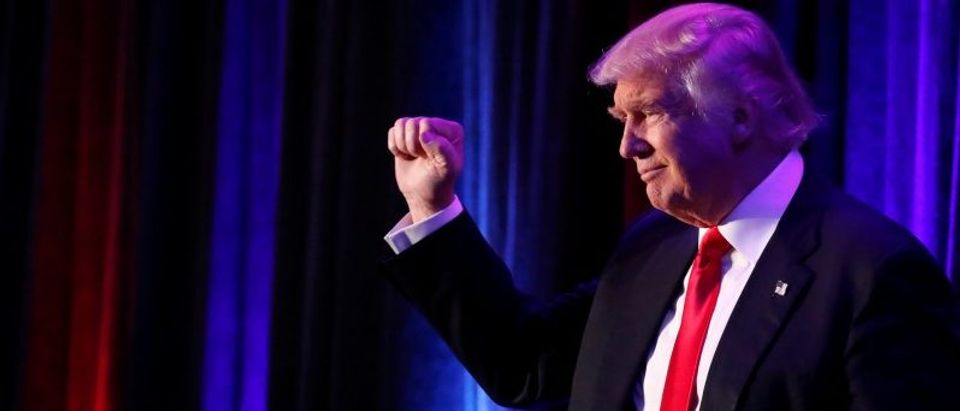As I said on Election Day, I think my knowledge of the history of modern electoral politics makes me more skeptical of seemingly fantastical scenarios where, say, a Republican wins Pennsylvania or Michigan. Being an “insider” can sometimes be a curse. Wisdom is good, but conventional wisdom is bad. But know this: Every year I have people (typically someone running for U.S. Senate or Congress) come to me and tell me they are going to do the impossible; they are going to pull off some miracle. And I’m just too stupid or cloistered to see it. And you know what? They end up going down in flames 99 times out of 100.
Don’t get me wrong, I always knew Trump would resonate with many voters in the Keystone and Wolverine States, but I never anticipated that he might overcome the Democratic machines in Philly or Detroit, or the soccer mom vote in the suburbs. (Here, I suspect, Hillary Clinton’s status as a less-than-inspiring candidate squashed voter turnout for her.)
That explains the rationale for my predictions, which were better than most—but they were still wrong. And let me say that I think this result was a surprise to everyone. I spent hours in the green rooms last week with surrogates and operatives from both parties who were privy to insider information and internal polling. And I observed not just their words, but also their body language and demeanor. The Clinton supporters truly believed she would win, and Trump supporters honestly thought he was about to lose.
The elephant in the room, of course, is the pollsters. For a long time, they generally got it right. And if you suggested that their assumptions might be skewed, you were mocked soundly as a “poll truther.” In 2012, it turned out that they were right, and I think those of us who were skeptical of conventional wisdom might have over-learned that lesson this time around.
Luckily, I remained somewhat skeptical. On CNN, I said, “Pollsters make assumptions about who is going to show up at the polls. And so, if they get those assumptions wrong, it skews everything else. And so, if there are more Hispanics or less than we assume, that could be the race. If there is a hidden white vote, a hidden working-class white “Joe Six-pack” kind of vote, then maybe Trump surprises everybody and wins Pennsylvania and Michigan and it’s a crazy night.” And then on Election Day, I said, “I assume that there is a hidden working-class white vote.” So I was more right than most, but still wrong; I still believed that Clinton would win a narrow electoral college victory.
You can’t blame people for buying into groupthink and trusting the polls (although, I think we’ve learned our lesson going forward). But I think there is another reason why it was very hard to find a respected political analyst or commentator who would have (not could have) predicted a Trump win—nobody wanted to endure the mockery that would ensue. For example, when I reported that a top pollster told me about old, white voters with no history of voting suddenly arriving at the polls, I got this mocking pushback. I didn’t think Trump would quite pull it off (for the reasons cited above), so I’d like to think this “working the refs” didn’t work on me. Regardless, I do suspect it impacts others.
So why do they do it? As I’ve written on numerous occasions, most journalists have a liberal worldview bias. Even more insidious and pervasive is the “Pauline Kael” problem of self-selection and self-segregation; most journalists don’t know a lot of Trump supporters. This doesn’t explain why so many missed the story, but I think it’s something that we must acknowledge and address.
To (re)earn the faith of our readers and viewers, it’s vital for us to audit our predictions to see how so many of the so-called-experts got it wrong. I do suspect that enforcement of orthodoxy by the “cool kids” on Twitter contributes to people (who want to be viewed as “serious” or “thoughtful”) deciding it’s safer not to question the conventional wisdom. It’s all about incentives—and just as bomb throwers have incentives to say outlandish things, people who aspire to be seen as mainstream have incentives to play it safe. If you’re going to be wrong, you want to be wrong with the group. But if you defy them, you will be mocked and ostracized. I’ve written about this before (regarding Newt Gingrich):
my experience is that humans hate losing — hate being made to look foolish — even more than they like winning (which is why poker players unwisely often go “full tilt” after losing a hand).
This psychological principle manifests itself often in — of all places — football games. Consider this: “Every single serious study of 4th-down decisions,” reports the New York Times football blog, “has found that, in most situations, teams would be better off by going for the conversion attempt rather than kicking.”
Yet despite consistent mathematical evidence that coaches should go for it on 4th-down, they reliably punt on 4th-downs. As the Times noted,
“Professor David Romer, author of one of the definitive papers on the subject, theorized that coaches are worried more about job security than winning. If a coach goes for it and fails, it’s his fault. But if he punts and loses, well, that’s just football, and his players take the blame.”
You get the analogy, of course. If you pick Trump and he loses, you get fired. It’s much safer to stick with the crowd and punt.


